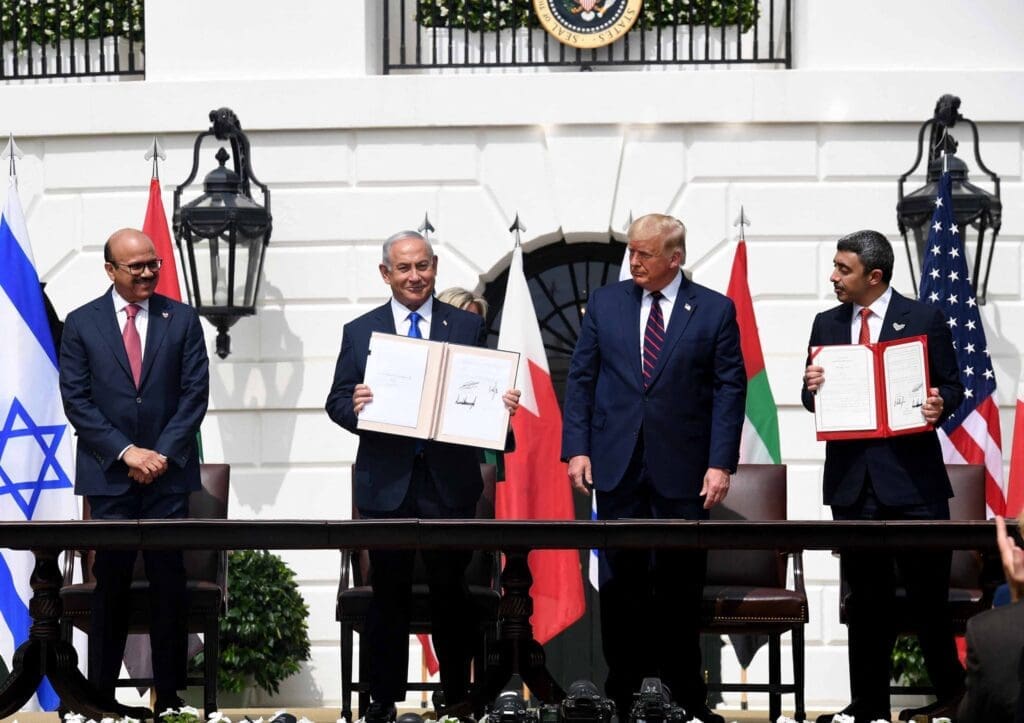When the United Arab Emirates normalized relations with Israel five years ago, it likely expected a degree of discomfort given negative public opinion of Israel in the region amid its ongoing military occupation of Palestine. But the intensification of violent conflict—first in May 2021, and then on a much larger scale after October 7, 2023—has shattered any illusions that relations could advance without much difficulty or downside. And yet, despite the devastating toll of the Gaza genocide, the UAE has shown no sign of severing ties with Israel, signaling Abu Dhabi still perceives more strategic value than cost in the relationship.
A central motivation behind Abu Dhabi’s initial decision to participate in the Abraham Accords in 2020—and its continued commitment to the arrangement despite the ongoing Gaza war—lies in its desire to enhance its standing among the U.S. political elite. Indeed, normalization has significantly bolstered the UAE’s image in Washington, enhancing its influence among U.S. policymakers. In instances where Abu Dhabi has diverged from U.S. positions, on issues ranging from the Sudanese conflict to the Russia-Ukraine war and the diplomatic rehabilitation of Syria’s former regime (until it was ousted in December), the Abraham Accords have served as a political buffer, tempering criticism and limiting the likelihood of punitive responses from Washington. But beyond relations with the U.S., the UAE has a host of reasons for concluding that normalization with Israel is, on balance, advancing its national interests.
Trade, Technology and Tourism
The UAE stands out as the leading Arab trade partner of Israel. No other country in the Arab world conducts as much business with Israel as the UAE—a distinction that has held firm throughout the Gaza genocide. Despite political pressures outlined below, bilateral trade has remained largely insulated, reflecting a willingness to shrug off public opinion in favor of shared economic interests and long-term strategic alignment. In 2024, UAE-Israel bilateral trade reached $3.2 billion, marking an 11 percent increase over the previous year.
This growth highlights the depth of the countries’ commercial integration—signaling a prioritization of stable, institutionalized economic relations. Israel was only the second of 27 countries to sign a Comprehensive Economic Partnership Agreements (CEPA) with the UAE, a deal that aims to expand non-oil bilateral trade to $10 billion by 2030.
As the Middle East’s two most dynamic technology hubs, the UAE and Israel have significantly deepened their partnership through bilateral collaboration in cutting-edge fields such as artificial intelligence, financial technology (fintech) and cybersecurity. They have found synergies through technology transfers, co-funded innovation projects, joint ventures and investment platforms focused on scaling emerging technologies.
For Abu Dhabi, Israeli tech know-how represents a critical opportunity to accelerate the UAE’s ambition of becoming a global center for innovation and digital transformation. Conversely, Tel Aviv views the UAE not only as a high-value consumer market for Israeli technologies but also as a strategic gateway into broader regional and international markets.
While the Abraham Accords in 2020 served to institutionalize and elevate this partnership, the foundations of UAE-Israel technological cooperation were laid covertly years earlier. As early as August 2013, the Emirati government had entered an agreement with Israeli cyber-intelligence firm NSO Group, granting it access to powerful surveillance tools including the infamous Pegasus spyware. Access to such advanced Israeli surveillance and defense technologies was a key incentive behind the UAE’s eventual decision to formalize diplomatic relations. This transactional layer of the normalization process underscores the extent to which strategic, technological and security calculations—not merely geopolitical symbolism—underpins Abu Dhabi’s approach.
Tourism has also emerged as a significant, albeit asymmetrical, pillar in the evolving relationship between the UAE—particularly Dubai—and Israel. While very few Emirati tourists have visited Israel, Dubai has rapidly become a premier destination for Israeli travelers, especially since the launch of direct flights between Tel Aviv and Dubai in June 2022. In early 2025, the Israeli media outlet Mako reported that Dubai had become the top winter travel destination for Israelis, accounting for over 10 percent of all flights leaving Ben Gurion Airport.
Trade and bilateral cooperation between the UAE and Israel have also expanded to many other areas since the deal, including agriculture, defense, education, energy, health and water security. This multifaceted collaboration reflects both countries’ shared ambitions to position themselves as innovation-driven economies and regional hubs for strategic investment.
Reputational Risks and Moral Costs
The Emirati-Israeli relationship has not been insulated from the broader repercussions of the Gaza crisis. Public support for the Abraham Accords began to diminish—both within the UAE and across the Gulf—even before Israel launched its genocidal campaign on Gaza in October 2023. Prominent Emirati figures who once championed normalization with Israel have since voiced critical reassessments of the Abraham Accords. Notably, in early 2024, Dhahi Khalfan Tamim, deputy chief of Dubai police and a widely followed public figure, remarked to his millions of social media followers: “The Arabs really wanted peace, but the leaders of Israel do not deserve respect.” Feeling the growing strain, Netanyahu recently dispatched his strategic affairs minister to Abu Dhabi to smooth things over.
Although bilateral trade remains strong, it is largely sustained by public sector transactions between the two governments. By contrast, Emirati business leaders—keenly attuned to reputational considerations—are increasingly wary of partnering with Israeli firms or individuals. As a result, they are recalibrating their cost-benefit analyses of such engagements, reflecting how the post–October 7 landscape has introduced new complexities into Emirati-Israeli commercial relations.
Moreover, the Palestinian question has once again become a defining moral and political issue across the Arab region and beyond. Against this backdrop, the UAE faces growing criticism for maintaining its commitment to the Abraham Accords. As harrowing images from the besieged enclave are broadcast around the clock, many in the region view Abu Dhabi’s continued full-fledged diplomatic relations with Israel as morally indefensible. For these audiences, the UAE’s posture raises a pressing question: Is there any threshold of Israeli conduct—however extreme or barbaric—that would compel Emirati leaders to reconsider their formal ties with a genocidal state butchering fellow Arabs?
Recent developments have also compelled Arab policymakers to reassess earlier assumptions about Israel’s role as a responsible actor and as a strategic counterweight to Iran’s influence. Israel’s increasingly unrestrained behavior—not only in Palestine, but also in Lebanon, Syria and Yemen—has raised alarm in Arab capitals about the implications for the collective security of Arab states. These concerns are compounded by the Israeli leadership’s open endorsement of a “Greater Israel” vision that entails territorial claims extending into multiple Arab countries, including two of the UAE’s fellow Gulf Cooperation Council members.
Emirati officials have grown increasingly aware of the risks associated with the UAE’s normalized relationship with Israel. In response to the situation in Gaza, Abu Dhabi has adopted sharper rhetoric condemning Israel’s rogue conduct, more consistently emphasized its position that Palestinian statehood is essential for lasting peace, and moved toward conducting ties with Israel in a more discreet manner. The UAE has also sought to promote the narrative that the Abraham Accords have granted it leverage over Israel—leverage it claims can be used to moderate Israeli behavior. However, when it comes to the war in Gaza and the increasingly annexationist push in the West Bank, evidence that Abu Dhabi has achieved any meaningful influence or restraint over Israeli actions is scant, at best.
Amid the ongoing war, the UAE has sought to project a humanitarian dimension into its policy by investing in relief operations aimed at alleviating civilian suffering in Gaza. Framing these efforts as evidence of its enduring solidarity with the Palestinian people, Abu Dhabi has coordinated with Israel to deliver aid via overland convoys through Egypt, and has participated alongside France, Germany, Italy, Jordan and Spain in aerial aid drops under the banner of Operation Birds of Goodness and Operation Chivalrous Knight 3. These initiatives serve not only as humanitarian gestures but also as strategic messaging—intended to counter perceptions that the UAE’s normalization with Israel has come at the expense of Palestinian interests.
On balance, the UAE continues to view its normalized relationship with Israel as aligned with its national interests, making the prospect of Abu Dhabi withdrawing from the Abraham Accords unlikely. Moreover, severing ties with Israel over Gaza could, in effect, amount to an implicit admission that normalization with Israel was a strategic miscalculation. Given the UAE’s aspiration to project itself as a forward-looking regional leader shaping the trajectory of the Middle East, the Emirati leadership would likely see such a reversal as undermining that carefully crafted image, potentially casting the country as reactive rather than strategic.
Nonetheless, as the humanitarian catastrophe in Gaza deepens, pressure on the UAE to abrogate the Abraham Accords is likely to intensify. Still, as nearly two years of genocide have yet to prompt such a decision, it remains uncertain whether any future developments would compel Abu Dhabi to reverse course. Given the UAE’s status as a wealthy, high-tech authoritarian state with strict limits on dissent and zero tolerance for public protest, the lack of visible opposition to the Abraham Accords within Emirati society is unsurprising. It reflects the leadership’s unrivaled capacity to tightly control the domestic narrative and contain political fallout, which allows it to bypass popular opinion in ways its peers cannot.
Ultimately, five years into the Abraham Accords, normalized Emirati-Israeli relations are proving resilient, despite the regional crises stemming from Gaza.


